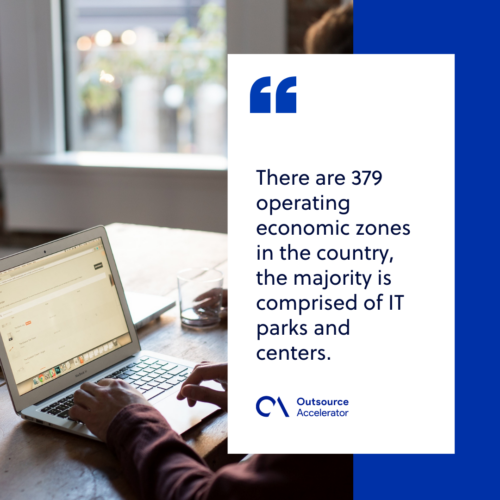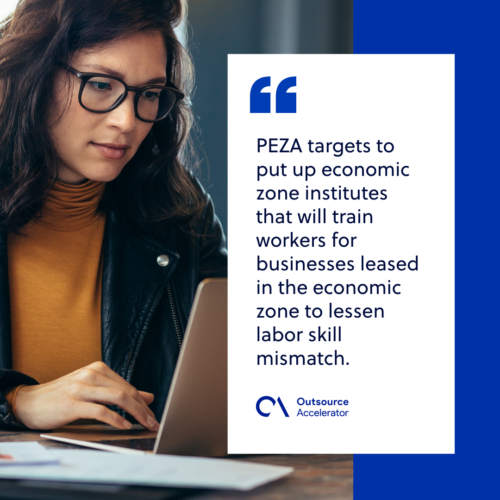PEZA incentives, requirements and locations

The Philippines, being a developing country, is establishing itself as one of the fastest-growing economies in Asia, thanks to the business process outsourcing (BPO) sector. With the ongoing Build, Build, Build project, foreign investors are continuously encouraged to invest and establish businesses in the country to develop more jobs and opportunities for the Filipinos.
However, the information technology – business process outsourcing (IT-BPO) industry is not the only one on the government’s agenda for development. In this article, we’ll delve into the agency that handles it all – PEZA, its purpose, its membership perks, and its contribution to the BPOs in the Philippines.
What is PEZA?
PEZA, or the Philippine Economic Zone Authority, is an agency attached to the Department of Trade and Industry (DTI) tasked to facilitate locator companies operating in different special economic zones across the country.
Founded in 1995 under Republic Act 7916, PEZA is given the government’s order of promoting, overseeing, and assisting foreign registered business enterprises and their operations.
Being a PEZA-registered company has its perks, and the BPO sector benefits the most from it. The agency even encourages more BPO companies to invest in the Philippines in order to promote and develop PEZA registered IT-BPOs in the Philippines.
Benefits of a PEZA-registered company
Under existing laws and orders, a PEZA-registered company is entitled to both fiscal and non-fiscal benefits, which can be enjoyed by the investors and their families.
Fiscal incentives
Other than the opportunity to establish a business at one of the economic centers in the Philippines, registered business enterprises (RBEs) are also entitled to:
- Income Tax Holiday (ITH) of up to six years
- A special tax rate of 5% of gross income after ITH and exemption to pay all national and local taxes
- Tax-free and duty-free importation of machinery, raw materials, and equipment
- VAT zero-rating of local purchases of goods and services
- Exemption from wharfage dues on import shipments of equipment
- Exemption from expanded withholding tax
Non-fiscal incentives
Aside from tax incentives, economic zone authority PEZA also gives its foreign members and their families benefits, such as:
- Simplified import-export procedures
- Employment of non-resident foreign nationals in supervisory, technical, or advisory positions
- Special Non-Immigrant Visa with multiple-entry privileges
- Extended visa assistance to foreign nationals, their spouses, and dependents
Advantages for the BPO industry
With the ability to enjoy tax incentives and the chance to be in one of the economic centers in the country, the BPO Industry will surely thrive in the country while enjoying the cheap cost of labor and equipment as well.
Business process outsourcing firms, from SMEs to enterprises, have the opportunity to expand their businesses to prime locations and special ecozones within the country, enabling them to cater to more clients and create more jobs for the Filipinos in the farthest locations.
Not only does it benefit IT-BPO companies, but they can also help their employees have better take-home pay for their families and bigger benefits through investing in their employees’ skills. This also opens job opportunities for more Filipinos below the poverty line.
Eligible sectors and services
PEZA registration is available to the following sectors:
- Information technology (IT) sector or the IT-BPOs
- Tourism sector
- Medical tourism sector
- Agro-industrial sector
- Manufacturing sector
In an effort to promote the IT industry in the Philippines, PEZA and DTI encourage more foreign tech businesses to invest in the country. As such, different IT Parks and buildings in the Philippines are constructed for this.
Eligible IT service activities eligible in PEZA registration include:
- Software development
- IT-enabled services such as data entry, transcription, call center, etc.
- Content development
- Knowledge-based and computer-enabled services, such as architectural and engineering consultancies, etc.
- Business Processing Outsource (BPOs)
- IT research
- Other IT-related services
PEZA requirements for BPO firms
To avail of these benefits, companies must register their businesses and locate them in a building or an establishment inside a PEZA special economic zone. In addition, companies must submit sets of Documentary, General and Technical, and Financial Requirements.
These requirements may vary depending on the sector. For the interested registered enterprises in the IT-BPO sector, these requirements include the following:
Documentary requirements
- Duly-filled Application Form (notarized)
- Corporate profile, which contains:
- A brief history of the company
- Existing and/or proposed business activities and projects
- Affiliated PEZA-registered companies
- Affiliated Bureau of Investments (BOI)-registered companies
- Principal officers and bio-data
- Audited Financial Statements for the past 3 years
- SEC Certificate of Registration
- Board Resolution for authorization of PEZA application and designation of a representative
- Project Brief
- Project Feasibility Study
- Anti-graft certificate
General and technical requirements (for preparation of feasibility study)
- Parent company and product brochures
- Description of a new project
- Detailed organizational chart
- Project timeline
- Potential market
- Service/process flow chart
- Detailed list of equipment, including country of origin, capacity, and costs
- Detailed list of materials, including sources and prices
- Area requirement
- Equipment layout
- Electricity/water requirement
- Waste and water disposal plan
- Principal officers and corresponding bio-data
- SEC Certificate of Registration
- Articles of Incorporation
Financial data and documentary requirements
- Matrix of employees with salary and position
- Matrix of foreign experts to be hired
- The projected volume of sales
- Breakdown of other USD costs
- Number of workdays and shifts per year
- Sources of financing
- Latest Audited Financial Statement. If any
- Parent company’s latest volume and value of sales, net income, total assets, and number of employees, if applicable
Upon completion of the given requirements, the application will then be evaluated and submitted to the PEZA Board for approval. Once approved, the application will be issued a PEZA Board Resolution. Then, additional requirements may be requested by the agency if needed.
PEZA special economic zones
As of November 2021, there are 415 operating ecozones in the country. A total of 297 of them are IT parks and centers. In terms of location, nearly all are located in the key cities of Metro Manila, particularly Quezon City, Makati, and Taguig.
However, efforts are also put in different regions, especially those near the Metro, to create more jobs and to develop the municipalities.
This can also help in veering the heavy traffic in Manila due to its congestion. There are also 139 ecozones under development with 99 of them being IT parks and centers.
Baguio City Economic Zone
The Baguio City Economic Zone is one of the three ecozones in the famous tourist destination, aside from John Hay Economic Zone and the SM Cyberpark.
The economic zone started to thrive in 2013, with the rise of expansions of business process outsourcing firms such as Sitel. As of 2016, the economic zone produced more than 12,000 employees from different sectors, with more than 8,000 attributed to BPOs.
Cavite Economic Zone
Cavite Economic Zone is one of the ecozones in the province of Cavite. The economic zone is located in Rosario and General Trias City, 30 kilometers south of Metro Manila.
Founded in 1980, Cavite Economic Zone was developed in five phases, which consist mostly of industrial power plants and sewerage facilities. To date, the fully-occupied CEZ has around 426 companies.
In January 2019, President Rodrigo Duterte signed the proclamation creating another special economic zone in Cavite named the Cavite IT ecozone or VistaHub BPO Molino.
It is formed with the continuous aim to encourage foreign investors to generate employment and establish linkage to different industries in the Philippines.
Clark Freeport Zone
PEZA, in coordination with the local government, the Bases Conversion and Development Association (BCDA), and Clark Development Community (CDC), drove more foreign businesses to the country, including the BPO sector through the establishment of Clark Freeport Zone.
It is one of the four districts being developed in Clark, Pampanga, with the three others as Clark Global City, Clark International Airport, and New Clark City. BCDA and CDC aim for it to be a hub of business, lifestyle, leisure, and modernity.
They won’t need to relocate elsewhere to find a job since it’s already in their area. They can now live a comfortable life and even spend more time on recreation, bonding with their families, and developing their passion.
Mactan Economic Zone
The Mactan Economic Zone, formerly known as Mactan Export Processing Zone, is a 119-hectare economic zone located in Cebu. It is managed by PEZA and Mactan Export Processing Zone Chamber of Exporters and Manufacturers since 1984, which currently has 148 member companies as of 2018.
Mactan Economic Zone is set to become a township to cater to business owners and workers in the near future.
Metro Manila IT Parks and Centers
Based on the latest Tholons 2019 Report, Manila still places at the 2nd spot in the Top 100 Super Cities, next to Bangalore. The construction of IT parks and centers contribute to this ranking.
It is no wonder that Metro Manila still has the largest number of IT parks in the Philippines. The most prominent of these are located in McKinley Hill in Taguig, Rockwell Business Center in Makati, Eastwood City, and UP-Ayala Technohub in Quezon City.
One of the advantages of setting up a business in Manila is the access to government agencies, with it being the business center in the Philippines.
PEZA updates
At the end of the first quarter of 2019, PEZA announced that its economic zones will be converted into townships, with the Mactan City Economic Zone to be set as an example. These “townships”, or smart cities, will have housing facilities, banks, and commercial centers like shopping malls that could accommodate IT-BPO companies expanding in the country.
This is so that company officials won’t have to travel in and out of the ecozones, and workers will have the chance to live, learn, work and play. Read all about it here.
Meanwhile, in the second quarter of the year, PEZA aims to rebrand and improve its offering with the addition of knowledge and technology innovation zones to be put up by public and private universities in the country, modeled after the Silicon Valley in California. The agency will start its rebranding by April 30.
The agency also targets to put up economic zone institutes that will train workers for businesses leased in the economic zone to lessen labor skill mismatch. Learn more about this in this article.
PEZA and the pandemic
There has been a rise of individual workers affected by the COVID-19 pandemic since its spread in the country last 2020. The Philippine government was particularly worried about call center workers and other graveyard shift employees as they have a lower immune system than employees in other industries.
To address this issue, the Philippine Economic Zone Authority, under PEZA’s Bayanihan business assistance, allowed its member companies to shift to remote work as a temporary measure.
This means that the regular ratio of 10% remote work and 90% on-site work arrangements for registered IT-BPO firms were canceled and member companies were allowed to 100% operate remotely.
Fast forward to 2022, work from home (WFH) was proven effective, especially in the IT-BPO sector. The “just a temporary measure” became the ideal work model for most industries going forward.
However, implementing a permanent hybrid work scheme was questioned by other organizations, specifically the Fiscal Incentives Review Board (FIRB). As the agency that grants tax incentives to registered business enterprises, FIRB argued that wfh arrangements violates the conditions given to the IT-BPO sector for them to keep their tax breaks.
FIRB denied multiple requests — from PEZA, industry body IT & Business Process Association (IBPAP), and other concerned organizations — to extend IT-BPOs remote working operations and mandated all businesses to go back to on-site work starting April 01, 2022, or risk losing their tax incentives and benefits that are given by the government.
PEZA’s 70:30 hybrid work scheme
However, the economic zone authority PEZA did not give up its efforts to maintain a work from the home system for its members. As an answer to FIRB’s mandate, the ecozone authority announced that they would allow their members to apply for a 70:30 hybrid work arrangement in their offices
The scheme, which is a departure from the regular ratio of 90:10, is PEZA’s way of cooperating with FIRB’s mandates and pushing for corporate recovery in the Philippines while appeasing their RBEs and industry employees.
PEZA explained that this scheme is not new and they have been issuing Letters of Authority (LOAs) to its interested registered enterprises applying for a hybrid operation prior to the COVID-19 pandemic. Now, due to the overwhelming request of continuing virtual or wfh schemes, they plan to continue this arrangement despite FIRB’s mandate.
As for institutionalizing hybrid work, PEZA is hoping that the next administration would give way to implementing laws that could make the hybrid work setup permanent for every professional in the Philippines.










 Independent
Independent




